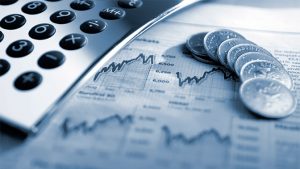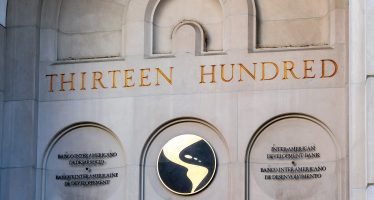Venezuela: As the Economy Sinks, Bond Markets Take Heart
 The country may be unable to buy food or medicine; Venezuela continues to meet with clockwork precision all its obligations to bondholders. Struggling with triple-digit inflation and deploying the army to supress food riots, the monumentally inept government of President Nicolás Maduro has so far refused to take a shortcut (or negotiate a haircut) and default on its debt. The president’s shenanigans have, however, spooked early investors holding Venezuelan sovereign debt. Bonds issued by the government or by state-owned oil company PDVSA trade on average at forty cents on the dollar.
The country may be unable to buy food or medicine; Venezuela continues to meet with clockwork precision all its obligations to bondholders. Struggling with triple-digit inflation and deploying the army to supress food riots, the monumentally inept government of President Nicolás Maduro has so far refused to take a shortcut (or negotiate a haircut) and default on its debt. The president’s shenanigans have, however, spooked early investors holding Venezuelan sovereign debt. Bonds issued by the government or by state-owned oil company PDVSA trade on average at forty cents on the dollar.
Data from credit default swaps indicate that the market estimates the likelihood of one-year contracts not being honoured at 61% – down from 78% in February 2016. Slowly, savvy and risk-tolerant investors are waking up to the fact the Venezuelan sovereigns are a veritable mint. The benchmark 2027 bond – a $4bn debt tranche raised in 1997 and the country’s most traded bond – pays a 9.25% semi-annual coupon and is currently trading at a 50% discount, pushing the yield up to just shy of 20%.
“Enjoying an average yield of 14.1%, investors holding Venezuelan bonds have earned around $7bn so far this year.”
Whilst the country’s economy is in such a mess that a default seems a given at some point in the none too distant future, most investors have already factored in this possibility and remain confident that any haircut will still keep them solidly in the money. More interestingly, a significant part of Venezuelan bonds – some $40bn worth by one estimate (out of a $61bn total) – lack collective action clauses (CACs) which force all creditors to sign on to whatever post-default restructuring deal is brokered. CACs are the bane of hedge funds – aka vultures – that insist on full repayment or hold out for improved terms.
Investors price non-CAC New York Law bonds – such as the issue maturing in 2027 – much higher. Though the yield of that bond is already impressive, the notes maturing in 2028 – carrying an identical coupon but, crucially, with a CAC clause – trade at a significantly higher discount, pushing their yield close to stratospheric height (with the attendant risk now close to certainty). Paying attention to the notoriously dull and extensive legalese that accompanies bond issues can be a profitable pursuit.
In any case, Venezuela will want to avoid a long (court) battle with the holders of non-CAC bonds who could, conceivably, seize both inbound and outbound oil shipments and PDVSA’s sizeable overseas assets. Whilst the country sits atop the world’s largest proven oil reserves (300+ billion barrels), Venezuela imports vast amounts of light crude oil which is mixed with its own extra-heavy crude to produce a marketable commodity.
The fate suffered by Argentina also discourages the Maduro Administration from applying its socialist rhetoric to bondholders. After 13 years of litigation, Argentina – all the while deprived from accessing international capital markets – lost its fight against the investors holding out for better terms than the ones offered after the 2002 default and was ultimately forced to pay up almost in full.
Finally, with Venezuela’s near-total dependency on oil exports, the country can ill afford to scare off investors as it will need untold billions to keep degraded oilfields from falling dry. This is why President Maduro repeatedly assures the markets that his administration will not renege on its commitments to bondholders. The administration has already made provisions for the repayment of short-term debt by liquidating $3.6bn of the gold reserves. In order to free up hard currency, the government has also cracked down on imports, reducing inbound trade by 42% in the first months of 2016.
Portfolio manager John Baur of Eaton Vance who oversees the firm’s Absolute Return Fund, in 2015 cut back his exposure to Venezuelan sovereign debt but has since reversed his stance. “The view is that the bonds are trading below their recovery value. The situation in the country is disastrous and they’re very likely to default at some point, but with the world’s largest oil reserves, you’re likely to see a recovery that is well above the current bond prices,” says Mr Baur.
Paradoxically, as Venezuela sinks deeper into a depression largely of its own making, the country’s bonds have already started to rally. While the country’s GDP is expected to shrink by 8% this year, market sentiment remains cautiously optimistic with one analyst – Francisco Rodríguez, chief economist at Torino Capital in New York – concluding that Venezuela is only temporarily being poorly run: “The way in which it’s run will shortly change. That change is now closer than most of the maturities of the outstanding bonds. What this means is that, considering current discount levels and yields, those bonds are a sound investment.” Not, though, for the faint-of-heart or those without the wherewithal to ride out any short to medium-term complications.
You may have an interest in also reading…
Don’t Expect Miracles from the Multilaterals
by Otaviano Canuto Latin American and Caribbean economies need help, but organisations such as the IDB are also stretched thin.
Otaviano Canuto, Center for Macroeconomics and Development: China’s Rebalancing Act is Slowly Addressing Sliding Growth Figures
China’s economic growth has been sliding since 2011, while its economic structure has gradually rebalanced toward lower dependence on investments
Shareholder Value: Outdated and an Obstacle to Corporate Success
The pursuit of increased shareholder value is much overrated, may hurt corporations and is certainly not the legal requirement some


















































































